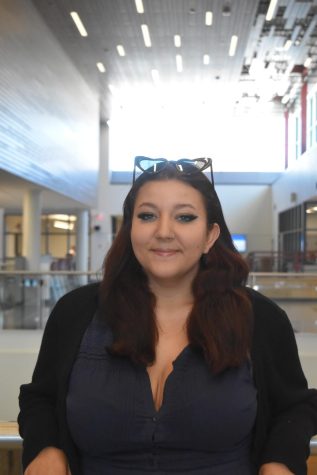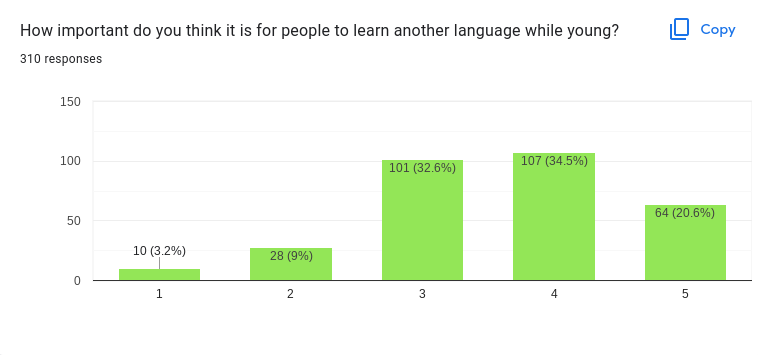The importance of learning another language
Due to problems plaguing Earth such as poverty, continual violence, global health issues, unity and forgiveness is needed to be instilled into the hearts of people globally more than anything. This unity is difficult to achieve and maintain without students being taught alternative languages at a young age.
Currently at Altoona, learning another language in school isn’t an option until freshman year of high school. Waiting this long to teach students something that is, in my opinion, a basic human necessity is very detrimental to not only them, but to the people around them, regardless of if they are multilingual or not.
In a study done in May 2009 by Cornell University at the Cornell Language Acquisition Lab, it has been proven that learning a second language at a young age has left an effect on tested children.
In the 2009 article “Learning a Second Language Is Good Childhood Mind Medicine,” senior science writer Susan Lang found that children who learn these alternative languages younger tend to have a better attention span than children who do not.
Based on Cornell University’s findings, it is evident that children should be exposed to these topics as young as elementary students.
Arguably, that age should be younger than elementary school children who typically range in ages from 5 to 11 years old. This is proven in a study that was conducted by Michigan State University in Jan. 2019.
In the article “Advantages of a Bilingual Brain”, early childhood educator Tracy Traunter discusses finding that children between the ages of 0-3 are more likely to learn an alternative language fluently due to their brains being in the most flexible stages. These children can adjust even as early as six months old.
Learning a language this young, let alone elementary school age, would allow time for everyone to grasp onto the harder concepts, learn and apply everything they know to everyday life and help solve the aforementioned problems that separate the entire human race.
In a Mountain Echo survey conducted amongst the students at Altoona who are currently taking a language elective, 310 people, teachers and students, responded to the survey to provide their opinions as well.
On a scale of one to five, one being the least important and five being the most important, 3.2 percent of students ranked learning a language young as one of the least important skills to learn while 20.6 percent ranked it being one of the most important skills to learn. This skill can be utilized for many things in general life as well.
“This could help if you are working in the medical field. If you have a patient that does not speak English, you can still help them,” sophomore Alana Rinehart said.
“Especially with Spanish, it’s becoming more and more common to see both online and hear people communicate in Spanish. At a younger age, you can have more knowledge by the time you’re high school age and get a better understanding,” sophomore Charles Romanowicz said.
These skills can only be grasped upon if the student is familiar with the topics a great amount of time before they are needed to be applied.
“It is important because if you learn it younger, then you have more time to learn it. Then, by the time you get a job, you will know the language fairly well,” sophomore Antonio Ross said.
Although this has been proven scientifically, some people tend to argue with the idea of children learning another language for a plethora of reasons.
“Learning a new language can be a very frustrating thing for students. I personally have felt the frustrations of trying to learn a completely new language and that can discourage students from learning,” senior Austin Parker said.
This can lead to other problems which reflect upon how students perform in their academic career.
“These students could be deprived of valuable time to learn “more important” subjects that they would probably use more often,” junior Jamin Dong said.
“At a young age kids don’t really have the attention span as an adult, so maybe they won’t listen as well. By not listening you can’t understand what is being told to you, which is easier to forget,” freshman Sophia Hallinan said.
However, these are not valid points because children and students all over the world have been taught different languages growing up. Being taught another language this young does not hinder being able to speak your native language. It is simply suggested that not all students will be able to learn another language to the point of being able to speak natively, instead of fluently.
“During my doctoral program, I had to study second language acquisition. Although I personally believe the younger the better, a study that we read from French-speaking Canada basically suggested that children who start younger will learn more of a second language than those who start later. It does not guarantee that all who participated in bilingual education at a young age will reach native language proficiency,” Doctor Mark Petarca said.
Additionally, it is not ethical for the United States to neglect others’ cultures and languages, especially when they prioritize ours.
“We can’t live our lives in a bubble, and it is bordering on arrogant for us to think that all other people in the world should adopt English while we make no effort to learn any other languages. Although English is the “language of business,” the advantages of learning another language are endless,” Spanish teacher Dane Leone said.

Hey! I'm Kenzi, and I am a senior here at the AAHS who writes for the Mountain Echo and Horseshoe Yearbook! This is my fourth year as a news reporter and...







